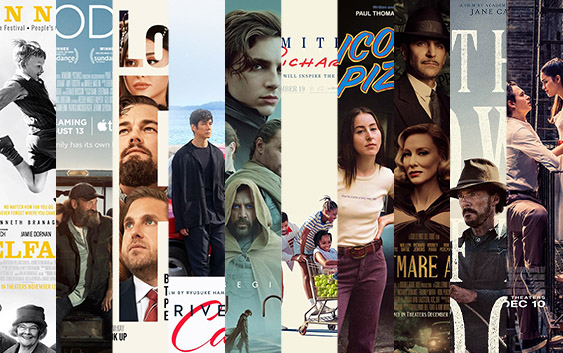
2022 Oscars Best Picture Nominees Ranked
Each year, the Academy of Motion Picture Arts & Sciences’ almost ten thousand members vote on the films they believe are the very best of their annual class, tagging each with an Oscars Best Picture nomination to offer to the world their collective expert opinion on which productions can claim to be the best, most important and most unmissable films.
In 2022, a rule change has ensured that the limit of ten nominees has been utilised for the first time since 2011, and the Academy Award list for Best Picture has once again proven to contain a rich tapestry of blockbuster, musical, arthouse and international film, with every big name in tinsel town from Warner Bros to Apple, Netflix to Universal, competing for the grandest critical prize in all of American cinema: the most popular film award in the world.
In this edition of Ranked from The Film Magazine, we are casting our critical eye over the Academy’s selections of the best of film from 2021 to judge each on artistic merit, social importance, and how much each evolves or shapes the art form, in this: the 2022 Oscars Best Picture Nominees Ranked.
Follow @thefilmagazine on Twitter.
10. Belfast

Oscars Bait: The Movie is a tonal mess, writer-director Kenneth Branagh (a five-time Oscars nominee prior to 2022) using the backdrop of one of the UK’s longest-running ideological and religious conflicts as a box ticking crowd-pleaser that appropriately tugs at the heartstrings and brings an underrepresented life into view, but much less appropriately ties these elements to musical interludes, action movie set pieces, and all your usual run-of-the-mill tricks to make a tough subject more palatable.
This film’s impressive £15million-plus haul at the UK box office is less a triumph of independent cinema representative of this film’s ability to touch the lives of millions, and more an indictment of Belfast’s inability to say anything challenging or meaningful. Kenneth Branagh’s early career Oscars nominations and a series of roles at the helm of big studio releases no doubt earned favour with the members of the Academy, but Belfast’s Best Picture nomination is one in the realm of Crash and Green Book: a film set around important things but with very little to say about them; one that wins nominations from the Academy of Motion Picture Arts & Sciences more because Academy members are desperate to illustrate their social awareness than because the film is of any kind of monumental importance to the form.
Belfast isn’t without quality – its performances being a particular highlight and worthy of attention both individually (especially for Judi Dench and Ciarán Hinds) and in terms of direction, Branagh’s mastering of his young lead’s (Jude Hill’s) performance being particularly strong – but between its black and white digital colour palette, stage-like interludes, expressionistic but tonally disparate strokes, and constant attempts to maintain engagement, Belfast is everything the Oscars look for put together in a cheap and patronising box of palatability that offers nothing to the ongoing re-evaluation of The Troubles and less still to the progression of cinema or the enlightenment of its audiences; leading to the question: how is this in the top 10 films of 2021?
Recommended for you: Best Animated Feature Oscar Winners Ranked
9. CODA

CODA’s existence is important. The fact that it is nominated at the Oscars is important. Its nominations across the Supporting Actor, Adapted Screenplay and Best Picture categories will bring this film and its cast of deaf leading actors a lot of attention. Whether it is deserving of such awards recognition for reasons of filmmaking excellence is another question entirely…
CODA is fundamentally a coming-of-age tale about a child of deaf adults (a CODA), complete with all the tropes and flaws of the average teen movie: mountains of expository dialogue, characters constantly explaining their motivations, character actions born out of convenience to the plot, “you don’t understand me” running away, cliché moments of romance (including a literal leap of faith), and a protagonist who seems to rarely if ever succumb to the pressures of her family. And it’s all written by a woman of hearing; one who isn’t a child of deaf adults.
It is by no means a disaster, CODA at least incorporating the deafness of its characters into a plot that considers their difficulties but doesn’t make their deafness its exclusive purpose. Yet, whilst its position as a film about an experience unknown and rarely discussed among the general public is praiseworthy and interesting, and the performance of Supporting Actor nominee Troy Kotsur is particularly strong, it is difficult to find any extraordinary filmmaking qualities in this Best Picture nominee. It’s not Belfast levels of box-ticking, but with the mite (and bank account) of Apple behind its awards push it is hardly the underdog it may seem, and courtesy of its subject it sits in the wheelhouse of the academy’s usual go-tos – the qualities of this particular nominee being less Lady Bird and more It’s Kind of a Funny Story.
